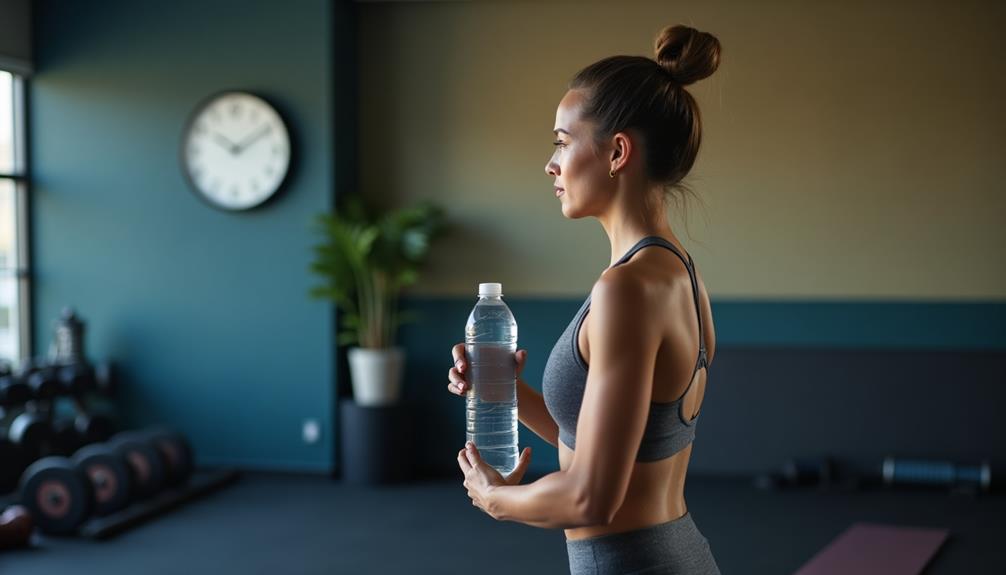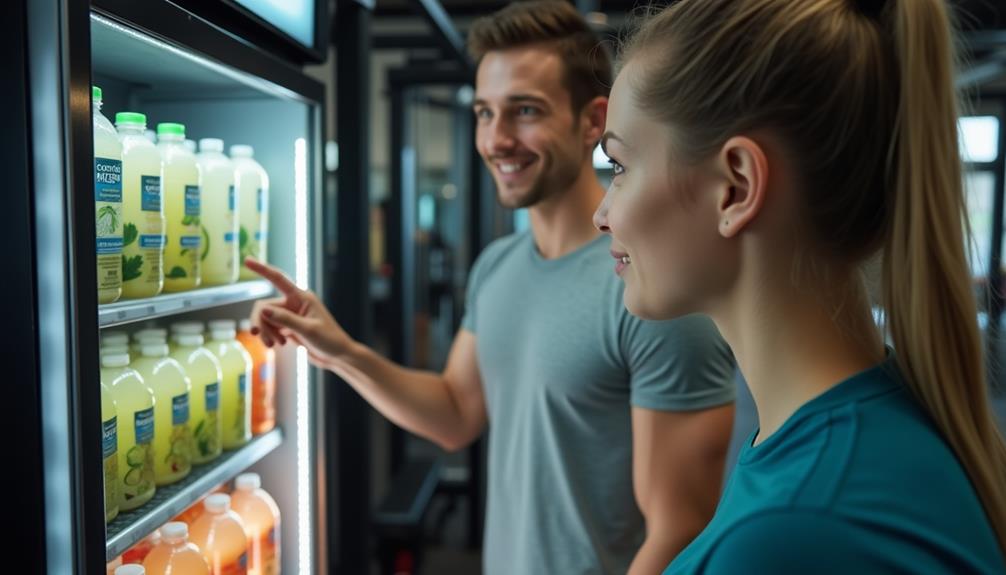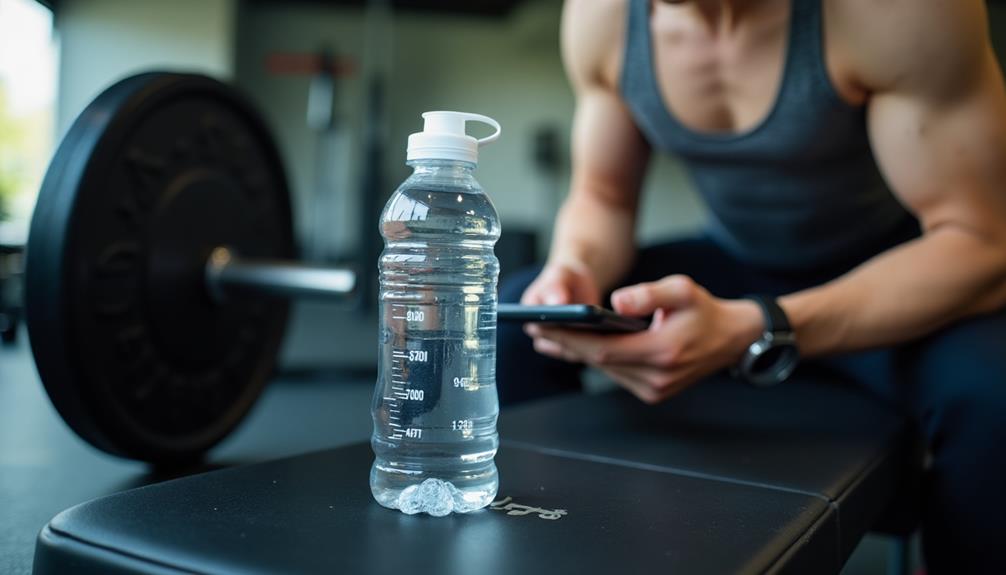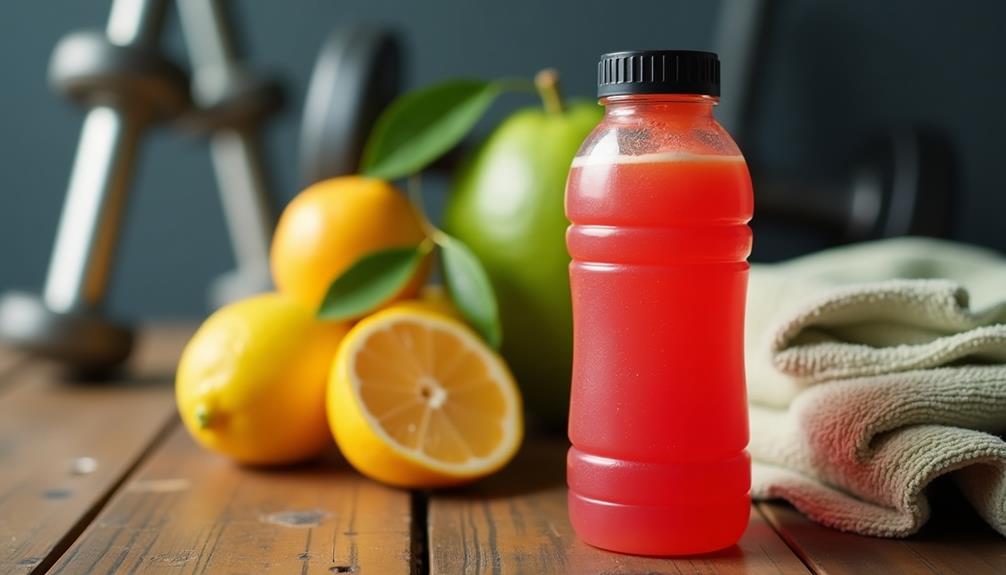To optimize post-lifting recovery, follow these five hydration tips. First, understand your hydration needs by evaluating fluid loss. Weigh yourself before and after workouts to gauge your intake. Next, time your fluid intake by sipping small amounts regularly after lifting. Aim for about 20-24 ounces for every pound lost. Choose the right beverages—like water or coconut water—for hydration. Monitor hydration levels by carrying a water bottle and checking your urine color. Finally, incorporate electrolytes into your routine within 30 minutes post-workout. This balanced approach maximizes your recovery and muscle performance. Explore more tips to enhance your regimen!
Core Insights
- Weigh yourself before and after workouts to assess fluid loss and adjust water intake accordingly.
- Sip on water or electrolyte-rich beverages consistently post-lifting to enhance fluid absorption and recovery.
- Aim for 20-24 ounces of hydration for every pound lost during your workout to prevent dehydration.
- Incorporate coconut water or electrolyte drinks within 30 minutes post-exercise to replenish lost minerals and support muscle function.
- Monitor urine color throughout the day to gauge hydration levels and ensure you're adequately hydrated.
Understand Your Hydration Needs

Understanding your hydration needs is crucial for effective post-lifting recuperation. After intense workouts, your body loses fluids, primarily through sweat. It's important to replenish these fluids to aid muscle recovery and prevent dehydration. Start by evaluating your sweat loss; a simple way is to weigh yourself before and after your workout. For every pound lost, aim to drink about 16-24 ounces of water. Additionally, consider factors like workout intensity and climate. If you're lifting in a hot environment, your hydration needs may increase. Incorporating electrolyte-rich beverages can also support recovery, especially after extended sessions. Electrolyte content is essential for peak hydration, physical performance, and mineral replenishment during workouts. Consider using hydration powders that offer a balance of essential electrolytes without excess sugars. Keeping a water bottle handy encourages regular sipping, ensuring you meet your hydration goals effectively. Remember, proper hydration is a vital part of your recovery plan.
Timing Your Fluid Intake

As you finish lifting, drink small amounts regularly rather than gulping down a large quantity all at once. Sipping consistently helps your body absorb the fluids more efficiently. For best hydration, consider incorporating top coconut water brands into your post-workout routine, as they offer natural electrolytes and essential nutrients. These can be especially beneficial for replenishing lost minerals during intense lifting sessions.
Continue to hydrate over the next few hours, targeting about 20-24 ounces for every pound lost during your session. Pay attention to your body's signals; if you're feeling thirsty, it's a clear sign you need more fluids. By prioritizing your hydration timing, you'll set the stage for a quicker and more effective recovery.
Choose the Right Beverages

Here's a quick comparison:
| Beverage | Benefits |
|---|---|
| Water | Hydration without calories |
| Coconut Water | Natural electrolytes |
| Protein Shake | Muscle recovery support |
Choose wisely based on your recovery needs. Staying hydrated with the right beverages helps you feel better and recover faster, so you're ready for your next session. Remember, your choices matter!
Monitor Hydration Levels

Your hydration levels can greatly impact your recovery after lifting. To guarantee you're replacing lost fluids, start by drinking water consistently throughout the day. For intense workouts or hot conditions, salt pills for hydration can help maintain electrolyte balance and prevent dehydration. A simple way to monitor your hydration is by checking the color of your urine. If it's pale yellow, you're likely well-hydrated. Darker urine indicates you should drink more water.
You can also weigh yourself before and after workouts to gauge fluid loss. A decrease of just 1-2% in body weight can suggest dehydration. Make it a habit to carry a water bottle during and after your session. This easy step will remind you to hydrate regularly. By staying mindful of your hydration, you'll support better recovery and enhance your overall performance.
Incorporate Electrolytes for Recovery

Monitoring hydration levels is just the first step in maximizing your recovery after lifting. Next, consider incorporating electrolytes into your post-workout routine. Electrolytes, like sodium, potassium, and magnesium, play an essential role in muscle function and fluid balance. When you sweat, you lose these crucial minerals, which can lead to cramping and fatigue.
To replenish your body, try electrolyte-rich drinks or even add a pinch of salt to your water. Coconut water is another excellent natural option. Aim to consume these electrolytes within 30 minutes of finishing your workout. This timing helps restore balance and aids in recovery. Remember, staying hydrated isn't just about water; it's about restoring what your body loses during intense lifting sessions.
Frequently Asked Questions
How Much Water Should I Drink After Lifting?
After lifting, aim to drink about 16-24 ounces of water for every pound lost during your workout. Listen to your body; it'll tell you when you're hydrated and ready to recover effectively.
Can I Hydrate With Food Instead of Drinks?
Yes, you can hydrate with food instead of drinks. Foods like fruits and vegetables contain high water content, which helps replenish fluids. Just remember to balance your intake with water for peak hydration.
Is Coconut Water Better Than Sports Drinks?
Coconut water's like nature's gentle embrace, soothing your thirst. While it's lower in sugar and rich in potassium, sports drinks pack electrolytes for intense recovery. Choose what fits your needs best; both have their merits!
What Signs Indicate Dehydration After a Workout?
After a workout, you might notice signs of dehydration like excessive thirst, dry mouth, fatigue, dizziness, or dark urine. Listening to your body's cues is essential for maintaining peak hydration and overall performance.
How Does Climate Affect My Hydration Needs Post-Lifting?
Climate greatly influences your hydration needs post-lifting. Hot, humid conditions increase sweat loss, necessitating you to drink more fluids. Conversely, cooler weather might lessen your thirst, but you still need to stay adequately hydrated.

